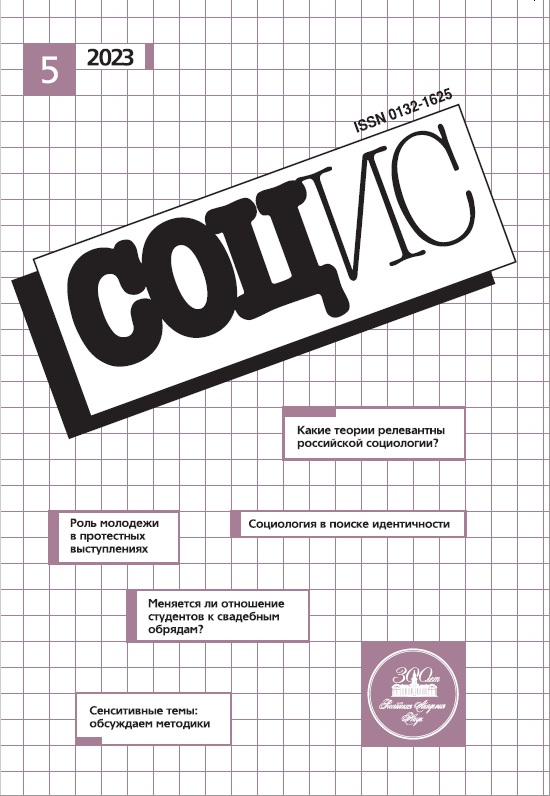Social Well-Being of Russians in the Spring of 2022
- Авторлар: Rogach O.V.1, Frolova E.2
-
Мекемелер:
- Financial University under the Government of the Russian Federation
- Russian State Social University
- Шығарылым: № 5 (2023)
- Беттер: 160-166
- Бөлім: Articles
- URL: https://cijournal.ru/0132-1625/article/view/661733
- DOI: https://doi.org/10.31857/S013216250024327-2
- ID: 661733
Дәйексөз келтіру
Аннотация
In this work, based on the materials of a sociological survey of Russians, an analysis of the social well-being of citizens after the onset of the economic crisis and the introduction of external sanctions is carried out. The empirical analysis is based on the data of the all-Russian survey of the population (N=4422) conducted by the authors in May 2022. The data obtained represent the opinion of Russians aged 18 years and older, divided into regions in all federal districts of the Russian Federation. The article presents an examination of two aspects of the social well-being of Russians in the context of the economic crisis. It is concluded that the emotional and psychological aspect is illustrated by an increase in anxiety and an increase in uncertainty about the future, an actualization of the risks of violating personal security. In turn, the behavioral aspect of considering the social well-being of Russians has the opposite character: despite the presence of signs of depression in the emotional background, the majority of Russians are oriented towards constructive actions. In particular, the following empirical results were obtained in the work: almost half of Russians faced the problem of job loss, there are difficulties with employment and a massive decline in incomes of the population. In view of these problems, 2/3 of Russians were forced to change their way of life (this was perceived most painfully by the female part of the population). Despite the general increase in anxiety, the majority of Russians are focused on the implementation of a new life strategy and are actively planning their future: get an education, go into business, change jobs. Correlation analysis showed a strong relationship between changes in the social well-being of the population and such a factor as the destruction of the usual way of life. At the same time, difficulties with work, the disappearance of familiar goods had a much lesser impact on the growth of anxiety among social groups in Russian society than the need to reduce spending and change lifestyles.
Негізгі сөздер
Авторлар туралы
Olga Rogach
Financial University under the Government of the Russian Federation78, Vernadsky Ave., Moscow, 119454
Elena Frolova
Russian State Social UniversityMoscow, st. V.Pika, building 4
Әдебиет тізімі
- Ананьев Б.Г. Человек как предмет познания. Л. 1969.Бауман З. Индивидуализированное общество / Пер. с англ. под ред. В.Л. Иноземцева. Москва: Логос, 2005. 390 с.Бутуева З.А. Социальное самочувствие людей старшего возраста в Республике Бурятия: региональный аспект // Вестник Института социологии. 2016. №4(19). С. 121-135. doi: 10.19181/vis.2016.19.4.435Гилевская Л.П. Социальное самочувствие белорусской молодёжи: социологический анализ // Экономические и социальные перемены: факты, тенденции, прогноз. 2010. № 2. С. 123-131.Гребняк О.В., Новоженина О.П. Структура социальной тревожности российского общества: гендерный акцент // Наука. Культура. Общество. 2022. № 28 (2S). С. 24-35. doi: 10.19181/nko.2022.28.2S.2. EDN KNQPPCКошарная Г.Б., Корж Н.В. Социальное самочувствие студенческой молодежи (региональный аспект) // Вестник Российского университета дружбы народов. Серия: Социология. 2020. № 20 (4). С. 905-918.Кошарная Г.Б., Бондаренко В.В., Танина М.А., Юрасов И.А. Влияние уровня жизни на социальное самочувствие населения провинциального региона // Известия высших учебных заведений. Поволжский регион. Общественные науки. 2020. № 1 (53). С. 113-125. doi: 10.21685/2072-3016-2020-1-10Лапин Н.И. Базовые ценности, социальное самочувствие и доверие институтам власти // IX Международная научная конференция по проблемам развития экономики и общества. М.: ГУ ВШЭ, 2007. С. 210-219.Лушникова О.Л. Социальное самочувствие сельских хакасов // Вестник Кемеровского государственного университета. Серия: Политические, социологические и экономические науки. 2020. №3 (17). С. 312-319.Мандыч И.А., Быкова А.В., Гейман О.Б. Особенности оценки инвестиционной привлекательности высокотехнологичных проектов // Russian Technological Journal. 2022. № 10(2). С.75-86. https://doi.org/10.32362/2500-316X-2022-10-2-75-86Рогач О.В., Фролова Е.В., Медведева Н.В. Туристский потенциал российских территорий: позиция муниципальных органов власти. Вопросы экономики. 2022. № 9. С. 125-138. doi: 10.32609/0042-8736-2022-9-125-138. Скуденков В.А. Экономические притязания в условиях мобилизации // Социология. 2022. № 5. С. 80-87.Сметанин А.В., Сметанина Л.М. К вопросу понятия «социальное самочувствие» // Научные труды Вольного экономического общества России. 2021. №230(4). С. 312-318.Соловей А.П., Шухно Е.В. Интерпретация и операционализация концепта «социальное самочувствие» // Синергия. 2018. №4. С. 72-77.Соян Ш.Ч., Монгуш О.Н. Самооценка материального положения молодежи Тувы // Социологические исследования. 2021. №10. С. 153-157. doi: 10.31857/S013216250015549-6Тихонова Н.Е., Слободенюк Е.Д. Бедность российских профессионалов: распространенность, причины, тенденции // Мир России. 2022. № 31 (1). С. 113-137. doi: 10.17323/1811-038Х-2022-31-1-113-137Хапова З.А. Социальное самочувствие: проблемы и противоречия дефиниции в контексте социологического подхода // Вестник Адыгейского государственного университета. Серия 1: Регионоведение: философия, история, социология, юриспруденция, политология, культурология. 2016. № 3 (184). С. 88-94.Фролова Е.В., Рогач О.В., Васильева Е.Ю. Дисфункции жилищного обеспечения детей-сирот как фактор их социальной эксклюзии. Социологические исследования. 2022. № 5. С.60-70. doi: 10.31857/S013216250018695-7Dоuglаs М., Wildavsky А. Risk and Culture: An Essay on the Selection of Technical and Environmental Dangers. Berkeley and London: Univ. of California Press, 1982, Pp. 222.Kimbu, A. N., Adam, I., Dayour, F., de Jong, A. COVID-19-Induced Redundancy and Socio-Psychological Well-Being of Tourism Employees: Implications for Organizational Recovery in a Resource-Scarce Context // Journal of Travel Research. 2023. №62(1). рр. 55-74. doi: 10.1177/00472875211054571Tiwari D.N., Misra G. Personality and Value Preference as Predictors of Social Well-being // Journal of Human Values. 2021. № 27(2). рр. 161-174. doi: 10.1177/0971685820965358To W.M., Gao J.H., Leung E.Y.W. The effects of job insecurity on employees’ financial well-being and work satisfaction among Chinese pink-collar workers // SAGE Open. 2020. 10(4). doi: 10.1177/2158244020982993
Қосымша файлдар









